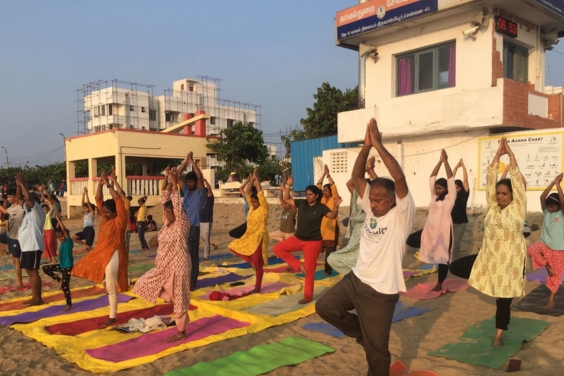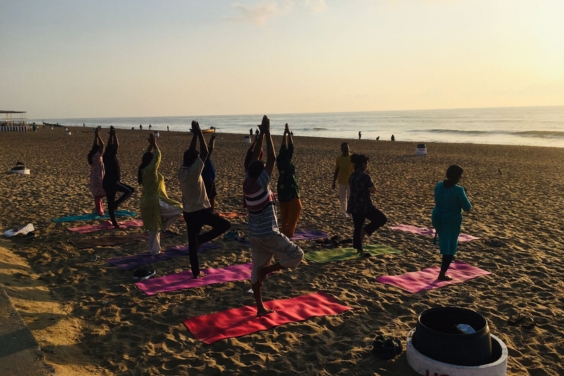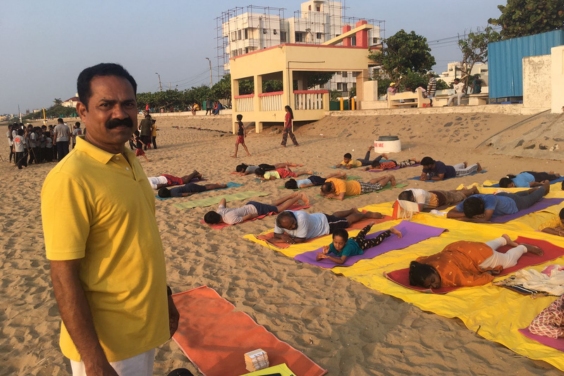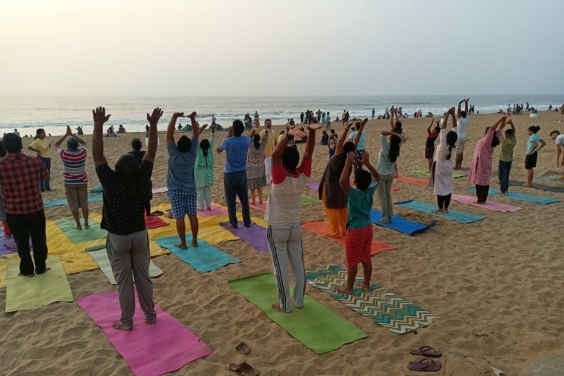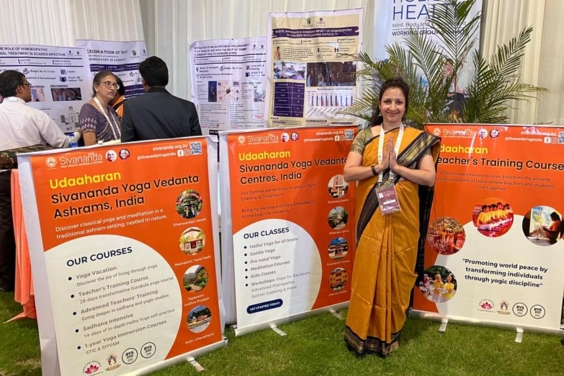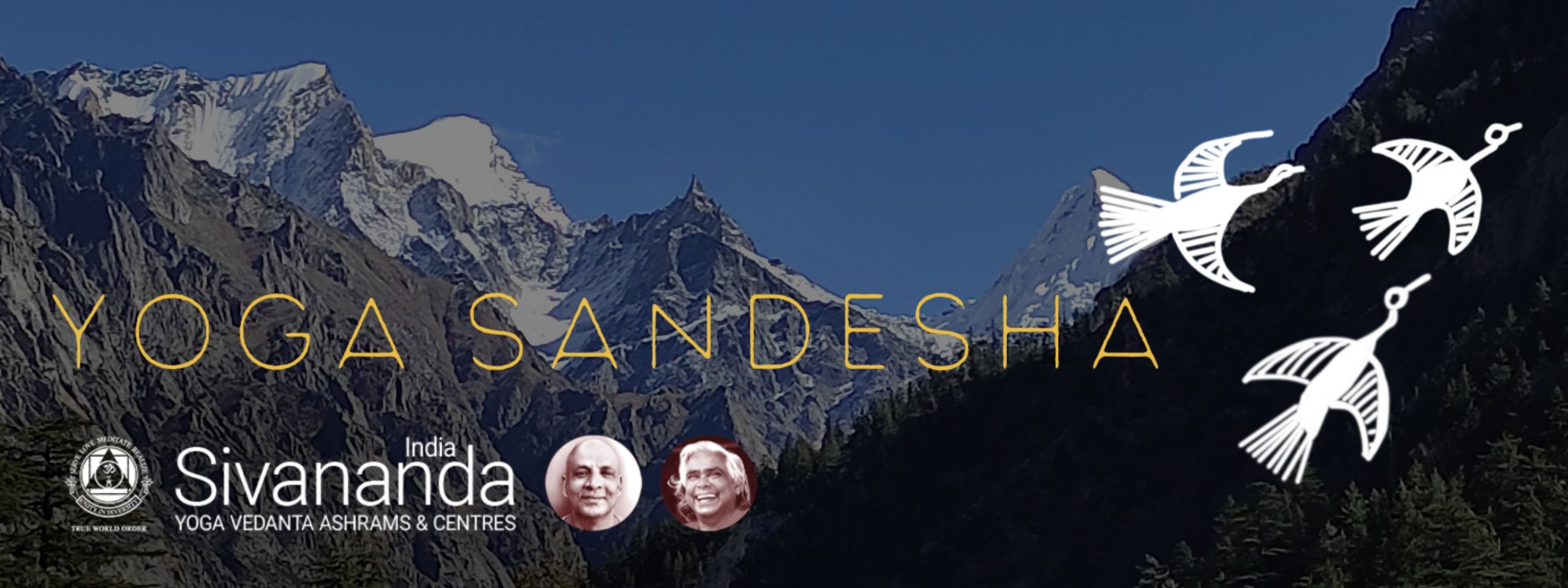
May 2023 | Strength
Om Namah Sivaya
Blessed Self,
Our teacher, Swami Vishnudevanandaji (Swamiji) always emphasised following one Guru and one set of teachings. Recent interactions with new students have made us realize the importance of keeping the teachings as given by Master, Swami Sivananda, and Swamiji as pure as possible. This is the main reason for the success of our organization, it reinforces the strong faith to follow the teachings implicitly and to not dilute them with other ideas. The beauty with all of Master’s teachings is their simple interpretation of the original Vedas and Upanishads. Swamiji made sure he has followed to the word and deed of those teachings as they are.
In India our Ayurveda programmes are continuing with full capacity, thanks to the dedicated team of doctors and therapists who are producing wonderful results for many ailments and diseases. The high season is coming to an end at our South Indian ashrams, and with upcoming Kids’ and Teens’ Camps, both completely full, showing the strength and timelessness of Swamiji’s teachings. With a very short period of promotion, our new TTC location in Himachal Pradesh received a good number of enthusiastic students, mainly from the Punjab, Delhi, and Chandigarh areas. There has been great interest in the newly announced Yoga Vacation programme in Netala, and the busy season for TTC has now begun there.
We the staff are fortunate to have the platform that Swamiji created where we can receive motivation for our own practice by serving the guests and students who regularly visit our locations.
Pranams to all,
Sivananda Yoga Vedanta Ashrams & Centres, India
Strength is not always what we think it is and we can discover that there are, in fact, many ways of being strong in life. This month we focus on strength: sharing Swami Sivananda’s words about Thought Power, Swami Chidananda’s words on the strength of Hanuman, understanding how to incorporate Ayurveda in your asana practice, the relevancy of the teachings of the Bhagavad Gita in daily life. We also share with you news about an accidental fire and loss in Gudur Ashram and how we can find the strength to rebuild and move forward.
We hope you enjoy the newsletter. As usual, please feel free to reach out to us with your thoughts and feedback: [email protected]
News Item:
Free Morning Beach Yoga Sessions
in Chennai
In collaboration with the Thiruvanmiyur Beach Walkers’ Association, the Chennai Centre is conducting free morning yoga sessions on the beach from 6 to 7 am daily. The classes have quickly grown to serve 150 students of all ages per week. The classes have helped to showcase the Centre within the community and provide an awareness of morning yoga practice, before the heat of the day sets in.
Photo Update:
G20 New Delhi Summit,
Integrated Holistic Heath Mind, Body, and Environment Working Group
Kapoorji, our senior course teacher, and Delhi teacher Pooja, attended the Integrated Holistic Health Working Group for Mind, Body, and Environment at the recent C20 meeting in New Delhi. They highlighted the TTC and the 5 Points of Yoga as best practices. The C20 Working Group will honour the teaching and create opportunites to multiply their effects and inspire others to replicate similar projects on a worldwide scale. These examples will be integrated with official documents submitted at the G20 Summit.
News Item: Fire in Gudur Ashram
Our Gudur ashram is surrounded by farmers’ fields. This is the season for local formers to burn their leftover leaves in the fields. Unfortunately, on April 12, it was very hot and dry and a spark from the farming fires blew into the ashram and ignited the roof of one of the main buildings with guest rooms. This entire building has sustained heavy damage to the amount of approximately $40,000 US. Windows were damaged and AC units destroyed. The building will need deep cleaning, painting, and construction of a new roof. It is a very unfortunate situation for the ashram as we were finally receiving good guest reservations for these rooms after three long years of the pandemic.
To enable us to rebuild these guest rooms for the future, we would be most grateful for your assistance in any amount as a donation. Donations received from within India will receive an 80G receipt. Thank you for your support and consideration at this difficult time. Donations may be made at the following link:
Research/Links
- An interesting article about the importance of strength training to help fight depression, including the role of yoga in strength training:
- Read more
Spiritual Calendar
May 1 – Ekadasi
May 5 – Full Moon
May 15 – Ekadasi
May 19 – New Moon
May 31 – Ekadasi
Upcoming Courses:
Learn, Practise & Grow with Us!
Teachers’ Training Course (TTC)
May 14 to June 10, Netala, Himalayas
May 28 to June 24, Madurai, Tamil Nadu
June 18 to July 15, Netala, Himalayas
August 13 to September 9, Neyyar Dam, Kerala
For more details, click here
Sivananda Teachers’ Immersion Course (STIC)
May 12, 2023 to May 11, 2024
For more details, click here
Courses in Thailand this fall at the Phu Chaisai Mountain Resort in Chiang Rai
Sadhana Intensive, September 16 to 30, 2023
Teachers’ Training Course, October 1 to 28, 2023
Advanced Teachers’ Training Course, October 1 to 28, 2023
Yoga Vacation, October 7 to 11 and October 21 to 25, 2023
For more details, click here
Teachings Excerpt:
Thought Power by Swami Sivananda

Be careful of your thoughts. Whatever you send out of your mind, comes back to you. Every thought you think, is a boomerang. If you hate another, hate will come back to you. If you love others, love will come back to you. An evil thought is thrice cursed. First, it harms the thinker by doing injustice to his mental body. Secondly, it harms the person who is its object. Lastly, it harms all mankind by vitiating the whole mental atmosphere.
Every evil thought is as a sword drawn on the person to whom it is directed. If you entertain thoughts of hatred, you are really a murderer of that man against whom you foster thoughts of hatred. You are your own suicide, because these thoughts rebound upon you only. A mind tenanted by evil thoughts acts as a magnet to attract like thoughts from others and thus intensifies the original evil. Evil thoughts thrown into the mental atmosphere poison receptive minds. To dwell on an evil thought gradually deprives it of its repulsiveness and impels the thinker to perform an action which embodies it.
Very carefully watch all your thoughts. Suppose you are assailed by gloomy thoughts. You experience depression. Take a small cup of milk or tea. Sit calmly. Close your eyes. Find out the cause for the depression and try to remove the cause. The best method to overcome the gloomy thoughts and the consequent depression, is to think of inspiring thoughts and inspiring things. Remember again, positive overcomes negative. This is a grand effective law of nature.
The science of thought power is very interesting and subtle. This thought-world is more real relatively than this physical universe. The power of thought is very great. Every thought of yours has a literal value to you in every possible way. The strength of your body, the strength of your mind, your success in life and the pleasures you give to others by your company – all depend on the nature and quality of your thoughts. You must know thought-culture, and develop thought power.
Teaching & Practice Tips:
Incorporating Ayurveda in Yoga Practice
Yoga and Ayurveda are sister sciences and are considered to be complimentary healing disciplines of India. Even though each modality has its specific approach to body-mind health, they overlap in their healing approach at various levels. While the purpose of both Yoga and Ayurveda are the same, Yoga is more a Vedic system of sadhana for self-realization while Ayurveda is the Vedic system that sets the universal rules of right living, self-healing, and medication. When the two come together your life becomes a sadhana or practicing right living on a daily basis.
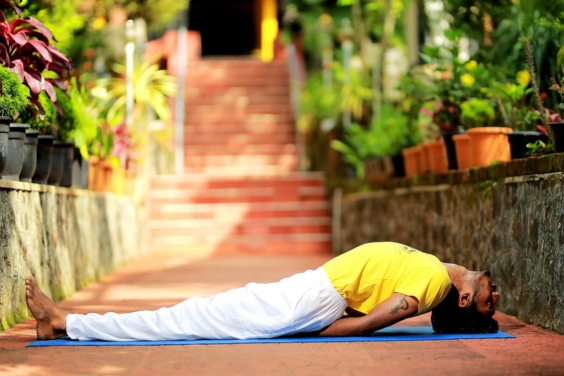
Ayurvedic Yoga reflects a Vedic approach to right living by supporting body and mind with Yoga and Ayurveda practices. Both disciplines teach us to align ourselves with the higher universal energies as the root level solution for body-mind health. Ayurveda helps implement the Yogic approach by classifying body and mind as different individual constitutional types, focussing on the fact that each person is different from an energetic standpoint. Ayurveda offers an approach to classify a person on the scale of specific body energy types (Vata, Pitta, or Kapha) and specific mind type (rajas, tamas, and sattva). With that understanding, the approach to practicing Yoga becomes more oriented to ‘individual constitution’ in order to bring about harmony in the physical and psychological states of a person. Thus, Ayurvedic Yoga focusses on the fact that just as you must eat right for balancing the body and mind tendencies, similarly, you must practice yoga in a way that is right for your individual constitution type.
Why practice Ayurvedic Yoga? Yogasanas designed according to an individual Ayurvedic constitution help achieve inner balance, taking body into a state of homeostasis. As per the Ayurvedic Yoga approach, a Yogasana modifies the energetic channels of the body which have a direct impact on our physical and psychological self. Thus, practicing in alignment with your energetic self not only helps the body correct imbalances, but it also has a healing impact on the mind, emotions, and psychological disorders. To support deeper healing, Ayurveda offers an internal medicinal approach including diet, herbs and therapies.
When practicing Ayurvedic Yoga, you first identify your individual constitution as per Ayurveda’s pattern mapping system. The classification is done at two levels:
- On the basis of the three gunas, sattva, rajas, and tamas that map you on the scale of your mental/emotional make-up.
- On the basis of the three doshas, vata, pitta, kapha, that represent the psychophysical model of balancing body-mind conditions.
Asana practice can be performed by considering these two body-mind energetic models to help increase or decrease the effects of dosha and bring about internal balance. The use of right breathing techniques is of utmost importance as breath can be used to modify the energetic effects of asanas. Engaging the mind with an intention also plays a huge role in the Ayurvedic Yoga approach, as energy follows where the mind and our intention goes. Therefore, unity of asana, prana, and mind can be adjusted in a way to get the desired energetic result.
Book Review: My Life Coach, the Bhagavad Gita
We all have inner and outer challenges which are sometimes beyond our control. We can come to a dead end where we really don’t know what to do. I suggest picking up the Bhagavad Gita and you will come to understand yourself and your situation more deeply.
When I had fallen down in life, I was picked up again by the teachings in the Bhagavad Gita. The Bhagavad Gita gave me the ability to analyse, understanding, and unfold my life in a better way.
There are 700 verses in Bhagavad Gita, all are important, however, the following verse was particularly empowering for me.
From Chapter 6, verse 5:
uddhared ātmanātmānaṁ nātmānam avasādayet
ātmaiva hyātmano bandhur ātmaiva ripur ātmanaḥ
Elevate yourself through the power of your mind, and do not degrade yourself. The mind can be the friend and also the enemy of the self. We are responsible for our own elevation or degradation.
The Bhagavad Gita teaches us how to come out of the problems of life, sorrows, delusions, attachment, and bondage by doing our duty efficiently. In the Bhagavad Gita, Lord Krishna says that duty is what we are supposed to do in a given situation. Delusion, worry, and anxiety are obstacles to performing our duty, and arise when we are dwelling on negativity and falling deeper into the problem.

When we act, either we reach our goal or we fail and learn from our experience. Lord Krishna teaches us that we should never engage in action for the sake of reward nor should we be inclined towards not performing any action. Doing action which is not reward-oriented is very powerful. Doing one’s duty selflessly gives birth to self confidence, that is a fundamental quality in order to live an effective and empowered life. Knowledge of our own powers and abilities allows us to think, speak, and act consciously and trust that we have the inner strength and power to succeed in life in any given situation.
— Pooja Chaturvedi, Dharamsala
Recipe:
Plant-Based Recipe – Pumpkin Coconut Latte
Pumpkin-Coconut Latte is a rich, creamy beverage full of body-supportive nutrients and imparts clean energy needed for a fulfillling yoga practice. What makes this vegan latte a yogic superfood is its nutrient-dense and alkalizing properties that restore mineral balance within your body to maintain the integrity of internal body functioning.
Ingredients (for 1 serving)
- 50 gms Pumpkin
- 20 gms Coconut Meat
- 7-8 Pre-soaked Almonds & Walnuts
- 1 Pre-soaked De-seeded Date
- 1 Pre-soaked Dried Fig
- An inch cinnamon
- Nutmeg Powder
- 1 Clove
- Add the cinnamon, nutmeg, and cloves
Instructions
Step 1: Pressure-cook chopped pumpkin, cinnamon, and almonds together for one whistle.
Step 2: Put cooked pumpkin in a blender and add chopped coconut, date, clove, and fig to blend all until the consistency becomes creamy and smooth.
Step 3: Pour in a mug and top it with a little nutmeg powder. Consume chilled. Enjoy!
Total Calories per serving: 250 Calories approx.
Please Note: You may add honey or coconut sugar to sweeten the latte.

“Ahimsa is not mere negative non-injury. It is positive, cosmic love. It is the development of a mental attitude in which hatred is replaced by love. Ahimsa is true sacrifice. Ahimsa is forgiveness. Ahimsa is Sakti (power). Ahimsa is true strength.”
-Swami Sivananda


